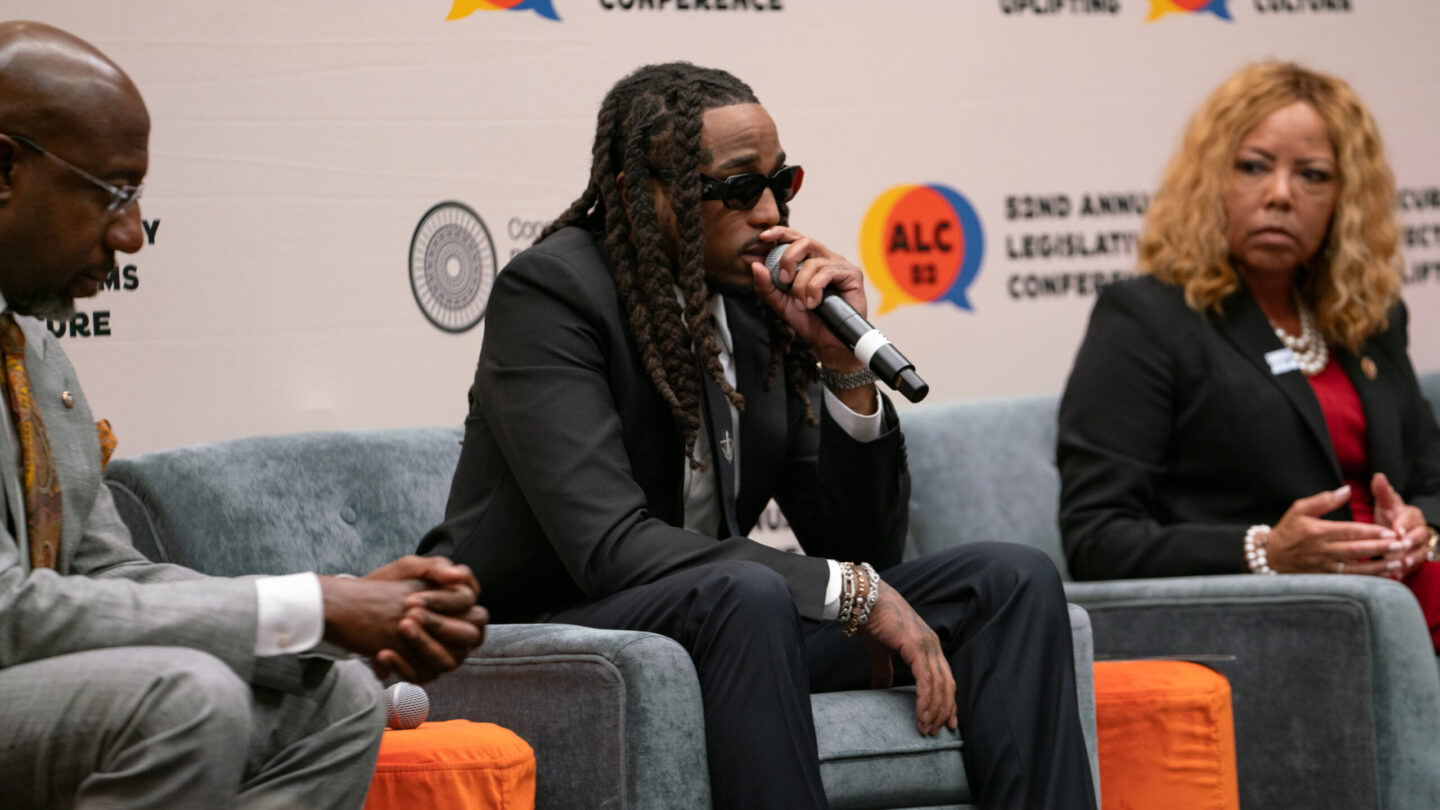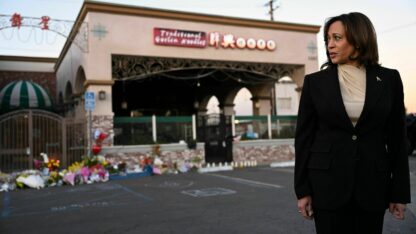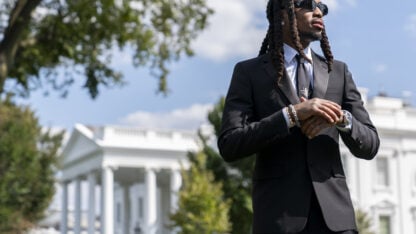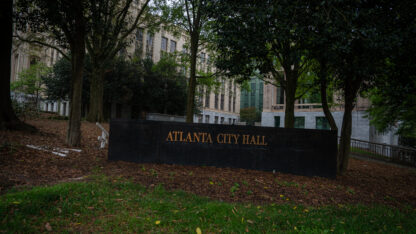The hip-hop community was irreversibly shaken last year when Takeoff, a member of the popular rap group Migos, was fatally shot. The loss of the rapper has greatly altered the lives of those closest to him, including his uncle, bandmate and best friend, Quavo, who was with him that dreadful night.
“This is a stage that I never thought that I’d be on,” Quavo, Quavious Keyate Marshall, said last week during a gun violence prevention panel at the Congressional Black Caucus’ annual legislative conference.
“All of this is just like a surreal moment,” he said.
Marshall is now an advocate for gun violence prevention. He founded the Rocket Foundation, a project to honor the life and legacy of Takeoff, Kirsnick Khari Ball. The organization supports and fundraises for gun violence prevention programs.
Last week, Quavo flew to Washington, D.C. to meet with Vice President Kamala Harris and speak on a panel with several political figures and gun violence prevention advocates, including Sen. Raphael Warnock of Georgia.
To acknowledge Quavo’s cultural significance and position on the panel, Warnock quoted the song “Self-Destruction” by the ’80s group, The Stop the Violence Movement:
Let’s get together or we’ll be falling apart
I heard a brother shot another, it broke my heart
I don’t understand the difficulty, people
Love your brother, treat him as an equal
He then nodded to another anti-violence hip-hop song, “Fight the Power” by Public Enemy.
“The rappers have had it right,” Warnock said.
Quavo repeatedly reminded the room that Takeoff’s death is “new” and a sore spot for him. He asked, if he, a superstar, is not protected then who is.
“While I’m dealing with this, I want you to go through this journey with me,” he said.
On Friday, President Biden unveiled a new office dedicated to reducing gun violence. It is an effort gun-control activists have long advocated for, including Greg Jackson, a gun violence survivor and member of the White House’s new office. Jackson is also the director of the Community Justice Action Fund, which the Rocket Foundation has funded.
Jackson sat alongside Quavo during the Congressional Black Caucus panel. He audibly held back tears when he described his late mentees, two teenage boys who were victims of gun violence.
The room was heavy with grief and countless stories of gun violence, though an immovable sense of hope lingered in the air.
The following stories and quotes are from people who attended the Congressional Black Caucus’ Annual Legislative Conference panel titled “The Moral Urgency to Prevent Gun Violence” on Wednesday, Sept. 20, 2023.
Jaisa Gooden
Gooden is a 30-year-old from the east side of Atlanta, Georgia.
Before the panel began, the attendees were asked to raise their hand if they had ever survived a gun violence incident, or lost a friend or family member to one. Gooden raised her hand for all three scenarios.
“From a young age, from a junior in high school, I was attending funerals of friends who were impacted by gun violence,” Gooden said. “I’ve been caught in a shooting in my own neighborhood.”
After the panel, Gooden said she is eager to build community projects and activities in her neighborhood to prevent gun violence.
Youth are less likely to give into negative environmental influences if they have positive role models who set clear standards of behavior, according to Communities That Care.
After the panel, Gooden started thinking about ways to get her neighborhood involved in healthy activities. As a runner, she is interested in hosting a gun violence awareness race.
“My city has been impacted significantly,” Gooden said. “It’s something so intertwined in the culture, in the music and the nightlife, to the point where I don’t even usually participate in going out the way that I used to.”
Brent Bailey
Bailey is a 26-year-old from New Orleans, Louisiana.
“Gun violence is so prevalent not just across the country but simply in my hometown,” Bailey said. “It never gets old, watching the news and seeing a parent literally yell, cry and scream for help.”
Jaylen Black
Black is a 26-year-old from the east side of Atlanta, Georgia.
“Growing up on the east side of Atlanta, it’s [gun violence] an everyday thing,” Black said. “I don’t know anybody who hasn’t been personally impacted. I mean, I grew up literally running out of parties because we were used to hearing gun shots and everybody knew to run, hide and duck, like it was so normal.”
Before the pandemic began, one of Black’s close friends was fatally shot over a misunderstanding while playing a game of “What’s under the cup.”
“People, when they think of gun violence in the Black community, they think of gangs and all this stuff, but in general, it’s just a lot of conflict,” she said. “People don’t know how to handle their emotions. People don’t know how to literally crisis manage.”
Mariah Cooley
Cooley is a 22-year-old from Peoria, Illinois.
When Cooley was 16-years-old, her cousin was shot and killed. It was her first personal association with gun violence, and it shaped her life and career.
“I was sick of stories like my cousin’s going unnoticed and unheard and then seeing the uproar for mass shootings,” Cooley said. “I want that same urgency and despair attached to these everyday killings that are killing Black people. So, that’s why I got involved, so I can work to be a part of the solution.”
Phelicia Jones
Jones is a 67-year-old who lives in San Francisco, California.
In 1979, her sister was shot and killed across the street from her parents’ home.
Jones resides in Bayview-Hunters Point, a predominantly Black neighborhood. Although she works to prevent gun violence in her community, she worries about the young men who engage in violent activities, such as gunfights, and neglect to finish their educational careers.
“I’m just constantly trying to bring hope to a hopeless situation,” Jones said.
Copyright 2023 NPR. To see more, visit https://www.npr.org.
9(MDAxODM0MDY4MDEyMTY4NDA3MzI3YjkzMw004))

9(MDAxODM0MDY4MDEyMTY4NDA3MzI3YjkzMw004))







